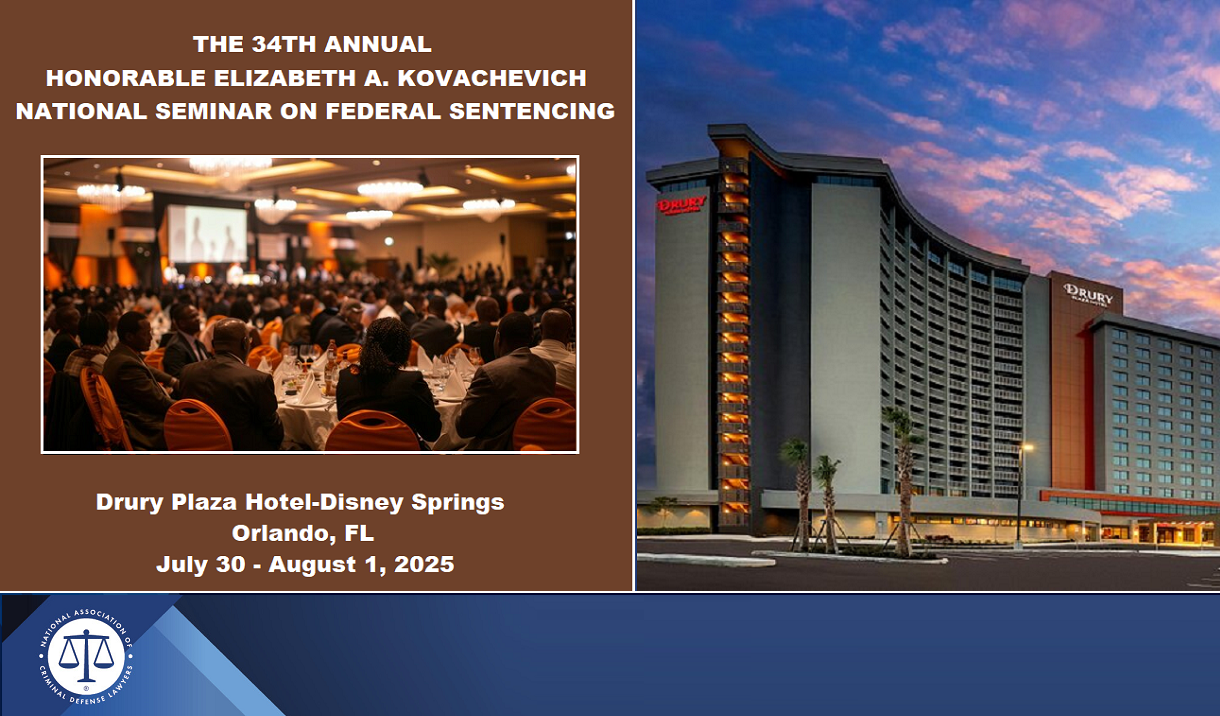Compassionate Release Motions and Decisions by Jurisdiction
Filter Results
Showing 1036 - 1050 of 1191 results
-
- Brief
United States v. Busby, 3:16CR211 (N.D. Tex Apr. 20, 2021)
Early Home Confinement Compassionate Release grant. Court held: "After considering all the information surrounding Defendant’s Chronic Lymphocytic Leukemia, his advanced age (68) and unique circumstances, and the elevated risk caused by the COVID-19 Pandemic, should the BOP end his home-confinement designation and reincarcerate him, the court finds that Defendant has shown extraordinary and compelling circumstances."
Order (Apr. 20, 2021)
-
- Brief
United States v. Reyes, 1:09CR239 (M.D.N.C. Dec. 11, 2020)
District court agrees that defendant’s home confinement conditions affect her need for access to medical care, noting that her doctor's appointments have to be pre-authorized by her RRC case manager and needed repeated removal of her GPS monitor to undergo diagnostic and surgical care; sentence reduced to time-served.
Defendant's Unopposed Motion to Reduce Sentence (Dec. 8, 2020)
Order granting compassionate release (Dec. 11, 2020)
-
- Brief
United States v. Calhoun, 3:08CR77-DPJ (S.D. Miss.)
2021 Home Confinement grant. Defendat argued in motion that hc does not resolve the cr motion because, after the pandmic ends, "Mr. Calhoun may be returned to a BOP correctional facility to complete his sentence—regardless of how faithfully he has followed every rule imposed and regardless of how well he has resettled into the community." The Court granted the motion, noting that Calhoun, who is on CARES Act HC, could be returned to prison." While Calhoun's medical issues "alone" might not be enough to grant relief, "in this case the BOP released Calhoun to home confinement over a year ago and he has had no infractions" "These are unusual times and circumstances, and the Government has not pointed to any further penological goals that are served by requiring Calhoun to remain on home confinement for six additional months to satisfy the technical requirements of a non-binding policy statement."
Supplement to Motion for Compassionate Release (Mar. 18, 2021) (arguing that
Order Granting Compassionate Release (May 14, 2021) (n
-
- Brief
United States v. Donnes, 1:16CR12 (D. Montana) (CARES Act HC grant)
CR Motion (May 21, 2021)
Government Response to Supplemental Reply (Aug. 10, 2021) (arguing that motion was not ripe becuase no one on CARES Act had yet been recalled back to prison).
Supplemental Reply (July 29, 2021)(discussing CARES Act HC and OLC Memo)
Order Granting Compassionate Release (Sept. 21, 2021) (finding ECR due to the defendant's need for assistance with his medical conditions which had been made logistically difficult due to his home confinement restrictions)
-
- Brief
United States v. Vaughn, No. 4:00CR126-CVE, ECF 1282 (N.D. Okla. July 1, 2021)
Mr. Vaughn had been convicted of a federal drug conspiracy for working as a “middle man” for several months in a cocaine and marijuana drug conspiracy. After turning down a 10-year plea offer, he was convicted at trial and sentenced to mandatory life based on two § 851 prior convictions. Jason argued that one of Mr. Vaughn’s § 851 priors would not qualify today and, regardless, the most serious mandatory minimum he could face today would be 25 years. Jason also noted that, due to changes in the law, Mr. Vaughn could not be sentenced as a career offender today either. After Jason was able to get the government on board, the court agreed, reducing the client’s sentence from LIFE to 25 years. The court found ECR existed because of:
1) the sentence disparity created by the change to § 851 in the First Step Act;
2) the fact that the mandatory minimum deprived the sentencing judge of any discretion (including running Mr. Vaughn’s state sentence concurrent to his federal sentence), and
3) the disparity between Mr. Vaughn’s sentence compared to co-defendants of greater culpability.
To add to this heavy lift, Jason also had to navigate a complicated state/federal concurrent sentencing issue. The government was not on board with Mr. Vaughn’s concurrent sentencing request, but Jason did a masterful job of presenting this issue to the court. If the BOP follows the court’s recommendation, the Mr. Vaughn will be released from custody next year.
Motion and Memorandum (July 1, 2021)
Order (July 9, 2021)
-
- Brief
United States v. Brown, 2021 WL 2383011 (N.D. W. Va. June 9, 2021)
AUSAs supported this time-served CR grant for a meth client who received a very long guideline sentence after going to trial. Remarkably: this is not a disparity case---nothing about Mr. Brown's sentence or guideline range would be different today. But the judge agreed that pre-2016 meth offenses like Brown's weren't nearly as serious as they typically are today.
Order (June 9, 2021)
-
- Brief
United States v. Steele, 2:10-cr-20037-JWL (D. Kan July 1, 2021)
Grant based on § 851, reducing 300-month meth sentence to time served, a 10-year reduction. Client received an 851 he would no longer be eligible for, plus signs of dementia (documented by family letter although not in BOP records), age, and some discussion of the fact that the case involved entrapment in the government’s undercover-enhanced case, even though jury still convicted.
Order (July 1, 2021)
-
- Brief
Last Prisoner Project Amicus: United States v. Scarmazzo, 1:06CR342 (E.D. Cal. June 1, 2021)
Amicus brief filed on behalf of compassionate release motion discussing the over-criminization of marijuana; the significant changes in marijuana laws over the years, and arguing that incarceration of non-violent cannabis offenders fails to serve the public interest.
Amicus Brief (E.D. Cal. June 1, 2021)
-
- Brief
United States v. McCauley, No. 07CR4009-SRB (W.D. Mo. June 23, 2021)
Grant based on family circumstances. The initial motion focused on changing societal attitudes about marijuana, but the attorney pivoted and smartly added a family circumstances argument in the reply brief, which turned out to be the winning issue. A great lesson on the importance of kitchen sinking our arguments in second look/excessive sentence cases---throw it all in.
Motion (addressing changing attitudes about marijuana) (April, 23, 2021)
Response (May 21, 2021)
Reply (June 3, 2021)
Order (June 23, 2021)
-
- Brief
United States v. Curry, No. 1:05CR282-TDS, 2021 WL 2644298 (M.D.N.C. June 25, 2021)
Mr. Curry was originally sentenced to life in prison in 2006 after a jury convicted of multiple drug counts and convictions under 18 U.S.C. § 924(c). After two resentencings, Mr. Curry was still subject to a 41 ½ year sentence, driven primarily by two stacked § 924(c) convictions in his case. His release date was projected as 2041 when Mr. Curry would be 65 years old. Judge had previously denied pre-McCoy.
Post McCoy, volunteers with ESP filed CR Reply (gov. had already responded to pro se motion) arguing that First Step Act’s changes to the § 924(c) stacking penalty would result in Mr. Curry receiving a much lower sentence today for the same convictions. Court granted motion, citing the “gross disparity” between the sentence Mr. Curry originally received and the sentence he would receive today along with his extensive rehabilitation while incarcerated. The district court reduced Mr. Curry’s sentence from 500 months to 240 months. Release date will now be 2022.
Motion to Extend Time to File Reply Brief
Motion to File Reply Brief in Excess of Word Limit
Reply (April 10, 2021)
Order (June 25, 2021)
-
- Brief
United States v. Vigneau, 473 F. Supp. 3d 31, 38 (D.R.I. 2020)
CR grant for defendant who had served 23 years of a 30-year sentence for a non-violent, no-gun, marijuana offense. Court based extraordinary and compelling reasons on the unusually long sentence given the offense conduct; that the sentencing court was constrained by pre-Booker mandatory guidelines; that it was highly unusual to charge someone with the offense of CCE (Continuring Criminal Enterprise) in that district; and changing societal views about marijuana: "While the Court must apply the current federal law with respect to marijuana, it can note the changing legal landscape since Mr. Vigneau was sentenced in 1998."
Order (July 21, 2020)
-
- Brief
United States v. Babb, 1:04CR190-ELH, ECF No. 274 (D. Md. June 4, 2021)
Unusual win under both the compassionate release statute and the crack retroactivity amendment, section 404 of the First Step Act. Mr. Babb had been serving a mandatory life sentence based on two § 851s, only one of which would still qualify today. Despite “extensive” criminal history, the court found that Mr. Babb “has continuously endeavored to improve himself and those around him.” The order also focuses on his age—at 50, “in just a few years he will be of an age by which he poses a reduced risk of recidivism.” CR granted, ECR based on “his model behavior while incarcerated, despite a seeming lack of hope that he would ever see freedom, and the changes in the sentencing landscape since 2007.” Order here, and Motion here.
Notably, even though the mandatory life statutory provision would no longer apply to Mr. Babb’s sentence, his guidelines remained life because they were based on the murder guideline, USSG § 2A1.1, so his guidelines remained life. The court noted, however, that since one § 851 no longer applied, “the Court would not be compelled to sentence him to life imprisonment.” The Court then reduced his sentence to 30 years, which, notably, was not a time-served sentence.
Compassionate Release Motion (June 30, 2020)
Government Response in Opposition (July 27, 2020)
Reply (Aug. 31, 2020)
Def's Supplement to Motion (Jan. 27, 2021)
Def's Supplemental Reply (Apr. 16, 2021)
Order (June 4, 2021)












